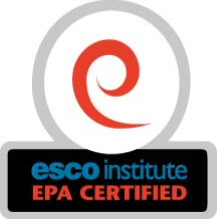Introducing: Penn Foster’s HVACR Technician Career Diploma Program
While Ashworth College is no longer accepting enrollments in our HVAC Technician Program, we’re excited to introduce you to our partner school, Penn Foster.

Open the door to a career in the skilled trades field with Penn Foster. In our online HVACR Career Diploma Program, you’ll gain the necessary skills to work in roles like HVAC technician, HVAC installer, refrigeration mechanic, refrigeration transporter, and refrigeration technician. At the end of the program, you’ll be ready to sit for the Environmental Protection Agency (EPA) certification exam, the cost of which is included in your tuition.
LEARN MORETake the Next Steps Towards a Career You Want
Penn Foster’s online HVACR Technician Career Diploma Program can help you prepare to take the first steps toward the job you want. With flexible, online courses, you can learn skills and knowledge on your schedule, from home.
Why Penn Foster?
Penn Foster has been on a mission to help people like you launch, accelerate, and thrive in their careers for more than 130 years. We provide students with a quality education that fits their busy lifestyle and budget, offering over 100 self-paced, career-relevant programs across our College, Career School, and High School. The program you choose is structured to fit your learning needs so you can achieve your goals, and is designed to work with your schedule, anytime, anywhere you want to study. With a focus on relevant skills and career preparation for the job you’re after, Penn Foster can help you graduate with confidence and help provide a pathway towards your career goals.
Certification may help you obtain work, improve your pay, and boost your career path.
Get career training without breaking the bank with our monthly payment plans.
Instructors and account support are all just a call, click, or email away.
What You'll Learn in Penn Foster’s HVAC Technician Career Diploma Program
- How to identify drawings, technical diagrams, and specification charts required for installation and repair of HVACR systems.
- How to list procedures for installing, inspecting, testing, repairing, and maintaining HVACR systems.
- How to display good work practices, demonstrate care for the environment, and follow the law when handling refrigerants.
- How to understand and apply government and state regulations and guidelines to installing, maintaining, and repairing refrigeration, heating, and cooling systems.
Penn Foster’s Online HVAC Training Online Curriculum
In our online HVAC training program, you'll build the necessary skills and knowledge to become an HVACR technician on your own time, from home. You'll also prepare to sit for the Environmental Protection Agency (EPA) certification exam. Your online classes include:
- Fundamentals of HVACR
- Residential and Light Commercial HVACR Systems
- Refrigeration Systems
- Commercial Systems and Troubleshooting
Professional certification
Our HVAC certification preparation includes the cost of the EPA Certification exam††. This certification ensures you understand how to safely handle chemical refrigerants. Federal law requires all working HVAC technicians to hold this certification.

HVACR Training Online FAQs
Credentialed HVAC technicians made an average of $27.55 per hour in 2023, or $57,300 per year.† Salary and hourly pay for technicians can vary based on experience, the state you live in, and your employer.
Yes. To work as an HVAC technician, most employers require applicants to have successfully completed relevant education like a career training program and many – if not all – require licensing to handle refrigerants. Entry-level HVACR technicians may need to complete an apprenticeship under experienced workers or supervisors after graduating from a trade school or vocational program. Click here for contact information for state licensing/regulatory boards and certain industry licensing information. To qualify for admission to a training program, online and traditional schools require either a high school diploma or high school equivalency exams. You can also contact your state licensing/regulatory boards for more information on industry licensing.
HVAC technicians work on heating, ventilation, cooling, and refrigeration systems that control the temperature and air quality in buildings. Daily work can include installing, cleaning, and maintaining HVAC systems, inspecting and testing systems, and repairing worn devices. Technicians can find themselves working as a contractor on both industrial and residential HVAC systems depending on their employer.
If you’re looking for a career in a hands-on field that offers the opportunity to work on a variety of projects, an HVAC technician job could be right for you. Besides allowing you to use your technical and problem-solving skills, the demand for HVAC technicians is projected to grow 9% over the next ten years, adding 42,500 new positions.†
The most common certification for HVAC technicians is the Environmental Protection Agency (EPA) Certification. This certification is required to install and repair heating and cooling systems, and to work with refrigerants.
When you study to become an HVAC technician with Penn Foster your classes are all self-paced, meaning you can take more or less time depending on what study schedule works best for you.
There is no set answer to how many certifications you should have. It is necessary to complete the EPA certification, however, there are many other Industry Competency Exams you can complete depending on the type of job you want and the state in which you live.
HVAC does not require advanced math skills, but you will need some foundational skills. Our Career Diploma covers the basic math you’ll need to properly perform electrical measurements, calculations, and conversions.
Type 1 HVAC technicians work with appliances that contain less than five pounds of refrigerant, while Type 2 HVAC technicians work on high-pressure appliances.
To become an HVAC technician, you’ll need to:
- Gain an education
- Get certified
- Complete an apprenticeship
State requirements
A career in this field may require you to meet certain licensing, training, and other requirements that can vary by vocation and state. You should check with your state, local government, and/or licensing board to find out which requirements may be applicable in your state. Click here for contact information on state licensing/regulatory boards and certain professional licensing information.

